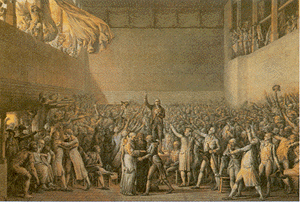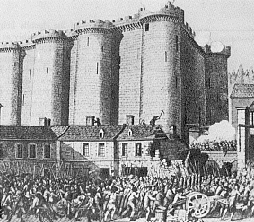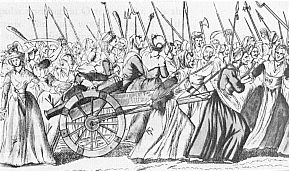The National Assembly
When the Estates-General held its first
meeting at Versailles on
May 5, 1789, Louis XVI ordered the
estates to meet separately
and to vote by estate. The Third Estate
demanded that the
Estates-General be transformed into
a National Assembly with
each member, not each estate, having
one vote. When the king
rejected the proposed National Assembly,
the representatives of
the Third Estate, on June 17, declared
themselves to be the
National Assembly. This was now a
revolution!
![]()
The Tennis Court Oath

Louis XVI, under pressure from the
nobles, locked the member
of the National Assembly out of the
hall in which it met. The
members assembled at an indoor tennis
court nearby. There, on
June 20, they swore never to disband
until they had given
France a constitution.
![]()
The Storming of the Bastille, July 14, 1789

On July 14 the event occurred that,
more than any other, has
symbolized the French Revolution -
the storming of the Bastille.
Incited by rumors that the king had
ordered troops to Paris to
disperse the National Assembly, a
Paris mob surrounded the Bastille
hoping to secure weapons and demanding
the removal of some
cannon the governor of the prison
had placed facing outward. The
crowd got out of hand, fighting began,
and soon the prison was in the
hands of the mob. The governor of
the prison was murdered as was
the mayor of Paris. Their heads were
mounted on pikes and paraded
through the city. When the Duke de
La Rochefoucauld-Liancourt
told King Louis XVI about the storming
of the Bastille, the king
angrily exclaimed, "This is a revolt!"
"No sire," replied the duke, "it is
a revolution."
The Great Fear
In late July, serious unrest called the "Great Fear" broke out in rural areas. Rumors reported an impending famine and told of bandits, in the pay of the nobles, roaming the countryside attacking peasants. Driven by fear and anger, the peasants armed themselves and prepared the fight the ruthless bandits. In addition, the peasants attacked many manor houses, often hoping to destroy the records of dues and services owned the lord. News of these disorded alarmed many of the delegates in the National Assembly.
Night Session of August 4
The events in Paris and the disorder
in the countryside forced the National Assembly into action. On the night
of August 4, the nobles and clergy offered to end tax exemptions of the
privileged classes, payment of feudal dues by
the peasants, the tithe, and all class distinctions.
It would prove to be the most sweeping and radical legislative session
of the whole French Revolution.
The Declaration
of the Rights of Man
On August 27, 1789, the National Assembly
adopted the Declaration of the Rights of Man and the Citizen, which embodied
many of the ideas of the philosophes. It declared that the authority
of a government is derived from
the people; that all citizens should be equal before
the law; that all citizens are entitled to a voice in making the nation's
laws; and that the purpose of government should be the protection of the
natural rights of men to liberty,
property, security, and resistance to oppression. Freedom
of speech, press, and religion should be guaranteed to all.
The Declaration, along with the English Bill of Rights, Declaration of Independence and US Constitution, ranks as one of the great documents of modern times.
The Declaration of the Rights of Man and Citizen (1789). From the Avalon Project at the Yale Law School.
March of the
Women to Versailles

In Paris new tensions were building.
A rumor circulated that at a
banquet in Versailles, newly arrived
soldiers had treated the
tricolor with disrespect. On October
5, an angry mob of some six
or seven thousand women set off for
Versailles dragging a cannon
and brandishing whatever makeshift
weapons they could lay their
hands on. They were followed by Lafayette
and 20,000 National
Guardsmen. They reached Versailles
in the evening and invaded
the National Assembly, calling for
bread and punishment of those
who had insulted the national flag.
Then the women marched to
Versailles and gained entrance to
the elegant apartment of the
queen. The king finally agreed to
the demands of the women and
under their escort journeyed with
his family to Paris. Henceforth,
the king and his family would be confined
to Paris, "more like
prisoners than Princes."
The Constitution
of 1791
The National Assembly continued its
efforts to draft a new constitution for France. At last, in September 1791,
the constitution was complete providing for a limited monarchy.